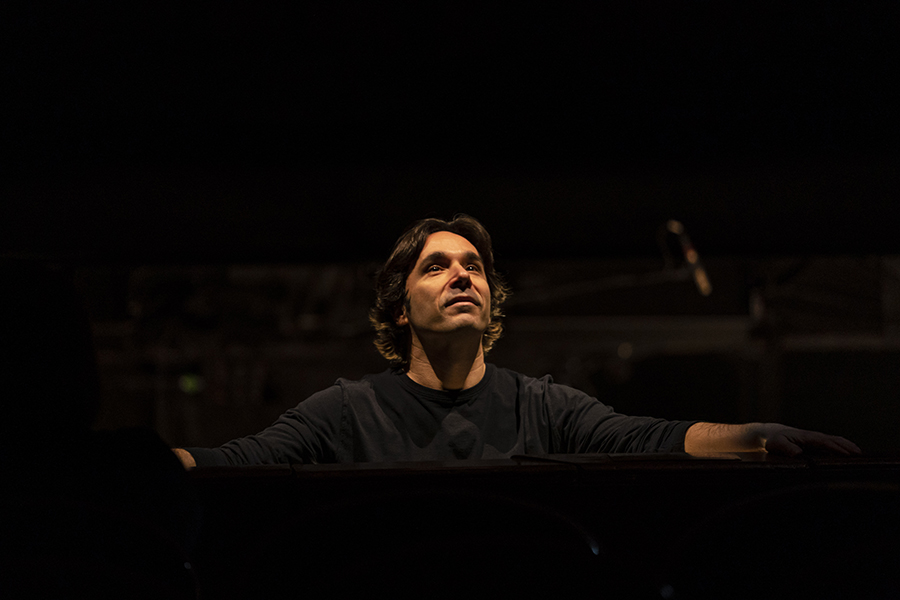February 22, 2023
Q&A with Maestro Henrik Nánási
Hungarian conductor Henrik Nánási returns to Lyric this spring for Bizet's blockbuster hit, Carmen. Previously at Lyric for Madama Butterfly (2019/20) and The Marriage of Figaro (2015/16), Maestro Nánási regularly conducts at leading opera houses around the world including the Metropolitan Opera, Royal Opera House Covent Garden, Teatro alla Scala, San Francisco Opera, Komische Oper Berlin (where he was General Music Director from 2012-2017), Bayerische Staatsoper, Opéra National de Paris, and more.
In this Q&A, read why Maestro Nánási enjoys performing with the Lyric Opera Orchestra, his advice for young musicans, and what he considers the most breathtaking moment in Carmen — onstage March 11 through April 7.

Maestro Nánási smiles at the audience before Lyric's dress rehearsal of Madama Butterfly.
You were last at Lyric for Madama Butterfly in the 2019/20 Season. How does it feel to be back in Chicago?
It's so wonderful to be back at Lyric. It's always good to return to a place where you have such great memories. Every time I came here it was a marvelous experience to work with this company because everyone is so involved and has a great work ethic. Every single person gives his very best to create a superb production in the end.
Why do you think Bizet's Carmen has stood the test of time? What makes it so popular?
Besides Bizet's incredible ingenuity for melody and rhythm, one of the main reasons that Carmen is an opera second to none is his use of contrasts. Bizet is brilliant at creating opposites: the carefree quality of operetta with the dramatic power of opera; the lightness of French orchestration to the sharpness of Spanish rhythms; the way he differentiates Carmen's character to Micaëla's, and José's to Escamillo's. This richness of contrast creates a nonstop tension from the first note to the last. It's like a fireworks display with so many different and exciting impulses that no audience can escape.
What is your favorite thing about performing with the Lyric Opera Orchestra?
I love their beautiful, warm, and full sound. We have done very diverse pieces together but the musicians feel at home in every musical style and period, and are very open-minded to new ideas; they are not scared to do things differently and try out new things. With Carmen we'll have another very different musical genre which must be played lightly but with sharpness at the same time. I look forward to this exciting musical journey with this great orchestra.
What advice would you give to young conductors or musicians at the start of their careers?
The most important thing to accept and appreciate at the same time is that being a musician is a never-ending process of learning and studying. Don't be satisfied with only studying the notes: a score can never be considered "studied". Keep your hunger for finding out as much as possible about the composer's life, his feelings, his intentions about all circumstances, because every great composer's work is a whole universe unto itself. So it is indeed very little to know just the notes, as Gustav Mahler said: "What is best in music is not to be found in the notes".
At the same time I find it extremely important to live a life yourself outside of music and have other interests too. If you don't experience life in all its facets, you will never be able to understand and interpret the emotional world of great symphonies or operas.
Do you have a favorite musical moment in Carmen?
The most breathtaking moment for me is when José closes his famous passionate Flower Song with the words "I love you" and Carmen responds in an unaccompanied, monotone "No, you don't love me". Any other woman would fall into the arms of the man singing such a declaration of love. But not Carmen — her line is lacking any emotion, almost brutally cold. For her line, Bizet uses the musical interval of the Tritone which is an interval so dissonant and "ugly" that during the Middle Ages, it earned the nickname "The Devil's Interval" and was avoided for centuries by composers. By using this interval this moment becomes even more merciless and from here on the action heads to the inevitable tragedy.

